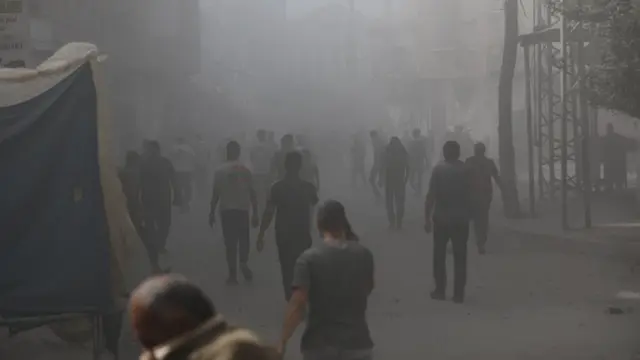
I was killed near aid distribution sites in Gaza, and the United Nations calls for "pressure on Israel"
The health authorities in Gaza said that the Israeli air fires and air strikes killed at least 25 Palestinians, at the parts of the Strip, at least five of them near two aid distribution sites run by the Gaza Humanitarian Foundation.
A paramedics at Al -Awda Hospital in the center of the sector said that at least three were killed and dozens were wounded by Israeli fire while trying to approach a site affiliated with the Gaza Humanitarian Foundation near the Natsarim axis.
Two others were killed, on their way, to another aid site in Rafah, in the south of the Strip.
A paramedic said that an air strike killed seven others in Beit Lahia, north of Gaza, and added that the rest were killed in separate air strikes in the southern Gaza Strip.
No comment has yet been issued by the Israeli army.
The most finished reading
The Gaza Humanitarian Foundation began distributing food aid in Gaza at the end of May after Israel partially lifted a full siege that lasted for nearly three months.
Dozens of Palestinians were killed in almost daily shootings during their attempts to reach food, according to the health authorities in Gaza.
The United Nations rejects the new distribution system supported by Israel and describes it as not sufficient and dangerous and is a violation of the principles of neutrality of humanitarian organizations.
At the same time, the Israeli army announced, on Sunday, the killing of one of its soldiers in the southern Gaza Strip, with the war between Israel and the Hamas movement entered its twentieth month.
The army said in a statement that the dead soldier is called the type of Shimish, who is 21 years old and is from Jerusalem. Thus, the number of deaths in the ranks of the Israeli army has risen since the start of land operations in the Gaza Strip, on October 27, 2023, to 430 soldiers.
The return of internet services after a three -day interruption
The Internet services returned to the Gaza Strip after a three -day interruption, according to Laith Daraghmeh, Executive Director of the Palestinian Telecommunications Regulatory Authority, told AFP on Saturday.
"The network is now operating throughout the Gaza Strip," Draghmeh said, pointing to the resumption of ground telecommunications services and optical fiber lines (Viber Ubtek).
On Thursday, the Ministry of Communications of the Palestinian Authority announced a complete interruption of fixed internet and communications services in the sector, as a result of targeting the last path of optical fibers, accusing Israel of being behind the attack, while no comment was issued from the Israeli side.
At the time, the Telecommunications Regulatory Authority said that "all fixed internet and communications services were completely interrupted in the Gaza Strip, after targeting the last main path of the Viber," accusing Israel of trying to "isolate Gaza from the outside world."
The authority indicated that the Israeli forces prevented the technical teams from repairing the cables, and obstructed attempts to reach alternative paths.
For its part, the Palestinian Red Crescent Society said, on Thursday, that the interruption of the Internet hindered the work of the emergency teams, as it caused the disruption of communication with the initial response teams scattered in the field.
The war in Gaza caused severe infrastructure damage across the sector, including water, electricity and road networks.
An international invitation to pressure Israel
On Thursday, the United Nations General Assembly adopted a non -binding resolution calling for "all necessary measures" to pressure Israel in a vote that raised criticism from the United States and Israel.
The decision, which came along the lines of the text that the United States obstructed last week to protect its ally Israel, calls for a "immediate, unconditional and lasting" ceasefire, along with the release of the hostages, and was adopted by 149 supporters, in exchange for the opposition of 12 countries, including the United States and Israel, and 19 countries from voting.
The decision holds Israel, as the "occupying power", a direct responsibility for the continuation of the war, calling for an immediate end of the siege on Gaza, the opening of all border crossings, and the guarantee of humanitarian aid to Palestinian civilians throughout the sector "immediately and broadly."
The decision also condemns "strongly" the use of civilization of civilians as a method of fighting, and "illegal ban" for the arrival of humanitarian aid.
At the end of May, after more than two months of the full siege, Israel allowed the opening of distribution centers for aid run by the "Gaza Humanitarian" organization, but these operations were marred by bloody incidents, which prompted the United Nations to refuse to cooperate with the organization because of "mysterious financing" and concern for neutral and professionalism.
The decision also calls on member states to "take all necessary measures, individually or collectively, in accordance with international law and the United Nations Charter, to ensure Israel's compliance with its obligations", without using the term "sanctions".
The Palestinian delegate to the United Nations, Riyad Mansour, called on the states to translate their vote into "verbs", calling for "real and immediate measures" to deter Israel from continuing its aggression.
Mansour said: "The measures that are taken today will determine the number of Palestinian children who will die tomorrow," referring to the killing, displacement and continuous starvation in the Strip.
The decision also renewed the assertion of the "fixed commitment" to the two -state solution, and the necessity of the Palestinians and the Israelis to live in safety and peace.





.jpeg)


ليست هناك تعليقات:
إرسال تعليق